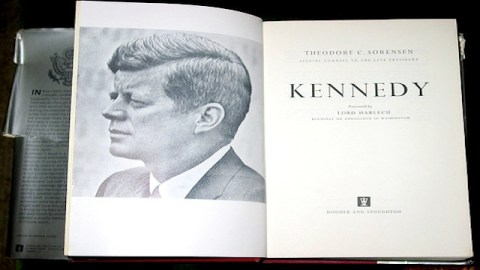What Ted Sorenson Did For Your Country

In this brief video accompanying their obituary, the New York Times asks Ted Sorenson to discuss his relationship with President Kennedy. It was a relationship without contemporary analog, like Sorenson himself. Remembering his legacy is appropriate today, as so much of America teems with emotion, not in ardor for but in disdain of politicians and politics. Sorenson’s contributions to the Kennedy Administration—and to JFK’s personal mission, ambition, and philosophy—set a bar. We must not lose sight of it.
These were the opening lines from John F. Kennedy’s Inaugural Address:
Vice President Johnson, Mr. Speaker, Mr. Chief Justice, President Eisenhower, Vice President Nixon, President Truman, reverend clergy, fellow citizens, we observe today not a victory of party, but a celebration of freedom—symbolizing an end, as well as a beginning—signifying renewal, as well as change. For I have sworn before you and Almighty God the same solemn oath our forebears prescribed nearly a century and three quarters ago.
The world is very different now. For man holds in his mortal hands the power to abolish all forms of human poverty and all forms of human life. And yet the same revolutionary beliefs for which our forebears fought are still at issue around the globe—the belief that the rights of man come not from the generosity of the state, but from the hand of God.
We dare not forget today that we are the heirs of that first revolution. Let the word go forth from this time and place, to friend and foe alike, that the torch has been passed to a new generation of Americans—born in this century, tempered by war, disciplined by a hard and bitter peace, proud of our ancient heritage—and unwilling to witness or permit the slow undoing of those human rights to which this Nation has always been committed, and to which we are committed today at home and around the world.
Let every nation know, whether it wishes us well or ill, that we shall pay any price, bear any burden, meet any hardship, support any friend, oppose any foe, in order to assure the
No one could give this speech today; its lyricism would fail focus groups. And while “Pay any price, bear any burden, meet any hardship” is remembered, “support any friend, oppose any foe” is less so. Are Americans still up to these empyrean tasks? Does the absence of an atom bomb lessen reason to reform bad habits, or can we recognize more nuanced threats as ones worth fighting against. Language was powerful then. American wanted it to be.
There has never been another writer quite like Sorenson; will there ever be? Can messages, or metaphors, however eloquent, still seduce across partisan lines? Kennedy and Sorenson worked to restore Americans’ faith in public service. This was the explicit mission of Profiles in Courage: to remind us that courage does exist in politics, and that at its best it can change the course of history.
Kennedy believed in political courage, and Sorenson believed in Kennedy. Who believes in what, or whom, today? This must be a tipping point. Cynicism has become the lazy choice.





